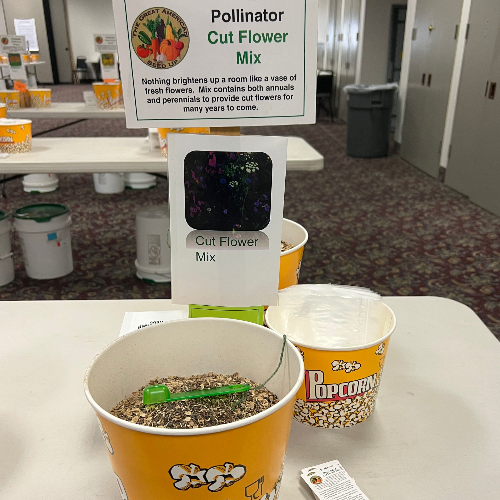
Growing Sustainability: The Great American Seed Up’s Mission to Empower Phoenix Through Seeds
By: Tyler Butler
In a world where sustainability is becoming increasingly urgent, events like The Great American Seed Up are a shining example of grassroots efforts aimed at securing a more viablefuture. For Greg Peterson, founder of The Urban Farm and co-founder of The Great American Seed Up, seeds are much more than tiny packets you buy at the store; they represent resilience, empowerment, and a pathway toward self-sufficiency. His mission, through initiatives like the Seed Up, is to ensure that people have access to the resources and knowledge to grow their own food, especially in urban areas like Phoenix.
Greg’s journey into seed saving began in 2011 after attending Seed School in Tucson with Bill McDorman and Belle Starr, the other co-founders of The Great American Seed Up. “I decided that I was going to create a seed bank because Phoenix doesn’t have a public seed bank,” Greg recalled. The idea behind a seed bank is simple but essential: storing a diverse range of seeds to ensure that, in times of need, people have access to them. “In the case of an emergency or some issue, the only place to get seeds are the seed racks at big box stores and local nurseries. That is nowhere near enough seeds to fortify Phoenix.”
However, Greg quickly realized that having a seed bank alone wasn’t enough. What about access to bulk seeds for the 4.7 million people in the Phoenix metropolitan area? That’s when the conversation with Bill and Belle evolved into The Great American Seed Up, an annual event where people can purchase bulk seeds at incredibly discounted prices. “The big thing about seeds is 90% of the cost of the seeds is in the packaging and marketing,” Greg explained. “We decided to let people pack their own seeds.”
The Seed Up isn’t just about affordability; it’s about education and community engagement. It serves as a platform for educating attendees on seed saving and the importance of heirloom seeds. These open-pollinated varieties—like the Armenian cucumbers or basil available at the event—can be saved and replanted year after year, growing better and more adapted to local conditions. “If you plant an Armenian cucumber, you’re going to get an Armenian cucumber,” Greg said, emphasizing the importance of non-hybrid seeds.
The energy at the Seed Up is palpable, according to Greg. “Imagine going into a room full of a hundred different open-pollinated seeds, and three or four hundred people are in there scooping seeds.” Over the years, it’s become a staple in the local community. From backyard gardeners to nonprofits like Heart for the City—an organization working to empower at-risk youth in West Phoenix—the impact has been profound. “They’ve been with us since the beginning, and I actually helped them build their first garden space at 69th Avenue and Bethany Home Road.”
The event not only helps the community access affordable, healthy seeds but also aims to inspire a local seed economy, particularly in response to global crises like the COVID-19 pandemic. “We saw it happen with Covid, where the grocery store shelves were empty,” Greg noted. “We have a three-day supply of food in any urban area. That’s it. When something like COVID happens, we have a three-hour supply because once people get wind that there’s an issue, they’re going to head to the grocery store and make sure they stock up.”
Through the Seed Up, Greg and his co-founders hope to provide the community with the knowledge and resources to mitigate these potential crises. “Ultimately, what I envision for the future of this event is education—and to put us out of business. Because I want people to be growing their own seeds, sharing their own seeds, in their neighborhoods. Those seeds that grow in your neighborhood are going to be the best for your community.”
Education remains at the core of the Seed Up, and Greg is adamant that knowing what to plant and when to plant it is crucial for any gardener. “You can go into a big box store in September or October, and they will sell you a cucumber or a watermelon. That is the total wrong time of year for that plant.” This is where resources like Greg’s free planting calendar for the low desert, available at Plantingcalendar.org, become indispensable.
For Greg, the success of the event is measured not by profits but by the number of people walking away with seeds and knowledge. “What I really want them to do is take those seeds and go start a garden.” After all, the seeds from The Great American Seed Up aren’t just meant for one season—they’re meant to keep giving, season after season, year after year.
Sidebar: Simple Steps for Seed Saving
The art of seed saving is both easy and invaluable, especially when it comes to heirloom seeds that can be used year after year. Follow these simple steps for a sustainable garden:
1. Choose Open-Pollinated Seeds: These heirloom varieties will breed true, meaning the plants grown from saved seeds will resemble the parent plant.
2. Let Your Plants Flower: Instead of harvesting all your crops, let a few plants go to seed. This could mean leaving your basil or carrots in the ground longer until they produce seeds.
3. Collect Seeds Carefully: Gently pluck the seed heads from the plant, like Greg does with his carrot plants, and store them in a cool, dry place until you’re ready to plant again.
4. Label and Store: Always label your seeds with the plant variety and date collected. Store them in a dry, airtight container to ensure longevity.
5. Repeat the Cycle: Year after year, as you continue saving seeds, you’ll notice your plants become more adapted to your garden’s conditions.
By saving seeds, you’re not just ensuring a thriving garden, you’re also contributing to a sustainable, resilient food system.
Learn more by visiting www.greatamericanseedup.org


